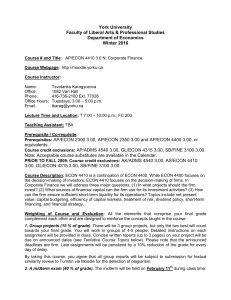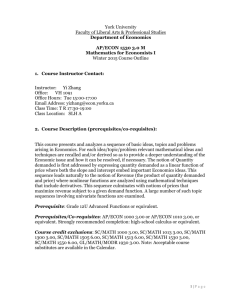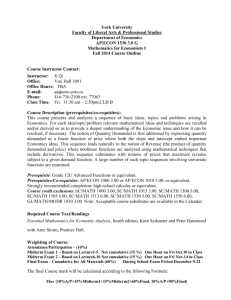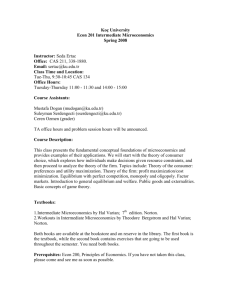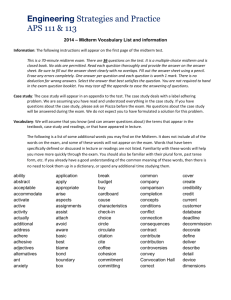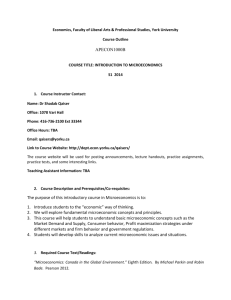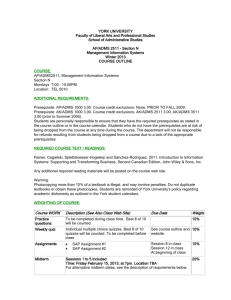ECON4400OutlineFall2014 - Faculty of Liberal Arts
advertisement
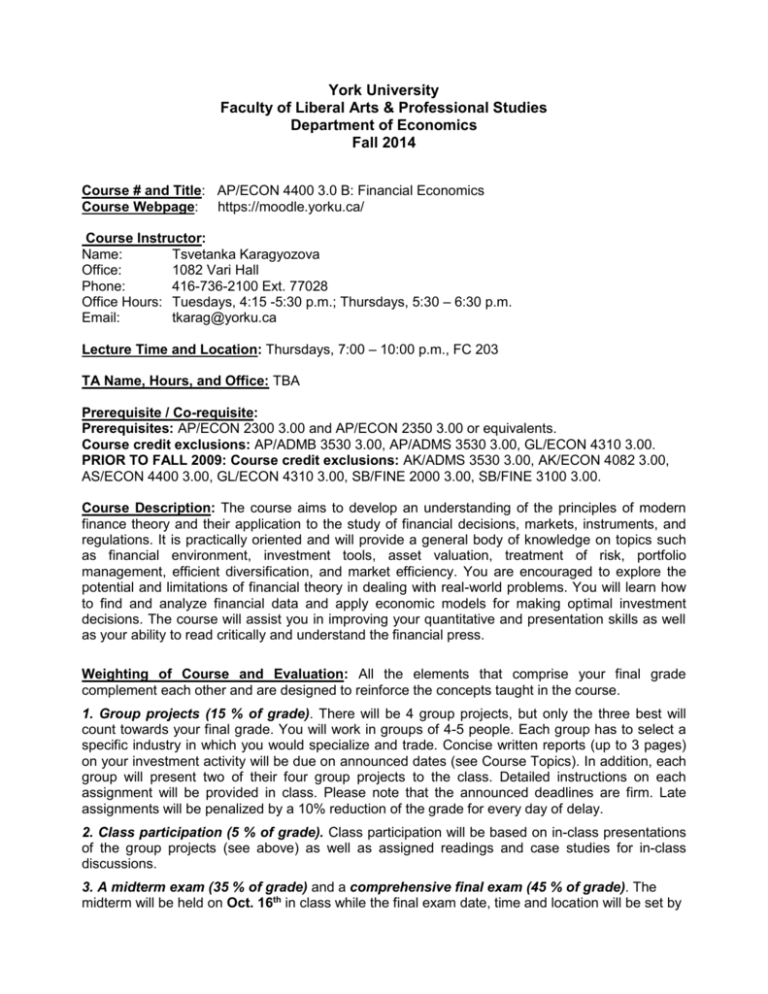
York University
Faculty of Liberal Arts & Professional Studies
Department of Economics
Fall 2014
Course # and Title: AP/ECON 4400 3.0 B: Financial Economics
Course Webpage: https://moodle.yorku.ca/
Course Instructor:
Name:
Tsvetanka Karagyozova
Office:
1082 Vari Hall
Phone:
416-736-2100 Ext. 77028
Office Hours: Tuesdays, 4:15 -5:30 p.m.; Thursdays, 5:30 – 6:30 p.m.
Email:
tkarag@yorku.ca
Lecture Time and Location: Thursdays, 7:00 – 10:00 p.m., FC 203
TA Name, Hours, and Office: TBA
Prerequisite / Co-requisite:
Prerequisites: AP/ECON 2300 3.00 and AP/ECON 2350 3.00 or equivalents.
Course credit exclusions: AP/ADMB 3530 3.00, AP/ADMS 3530 3.00, GL/ECON 4310 3.00.
PRIOR TO FALL 2009: Course credit exclusions: AK/ADMS 3530 3.00, AK/ECON 4082 3.00,
AS/ECON 4400 3.00, GL/ECON 4310 3.00, SB/FINE 2000 3.00, SB/FINE 3100 3.00.
Course Description: The course aims to develop an understanding of the principles of modern
finance theory and their application to the study of financial decisions, markets, instruments, and
regulations. It is practically oriented and will provide a general body of knowledge on topics such
as financial environment, investment tools, asset valuation, treatment of risk, portfolio
management, efficient diversification, and market efficiency. You are encouraged to explore the
potential and limitations of financial theory in dealing with real-world problems. You will learn how
to find and analyze financial data and apply economic models for making optimal investment
decisions. The course will assist you in improving your quantitative and presentation skills as well
as your ability to read critically and understand the financial press.
Weighting of Course and Evaluation: All the elements that comprise your final grade
complement each other and are designed to reinforce the concepts taught in the course.
1. Group projects (15 % of grade). There will be 4 group projects, but only the three best will
count towards your final grade. You will work in groups of 4-5 people. Each group has to select a
specific industry in which you would specialize and trade. Concise written reports (up to 3 pages)
on your investment activity will be due on announced dates (see Course Topics). In addition, each
group will present two of their four group projects to the class. Detailed instructions on each
assignment will be provided in class. Please note that the announced deadlines are firm. Late
assignments will be penalized by a 10% reduction of the grade for every day of delay.
2. Class participation (5 % of grade). Class participation will be based on in-class presentations
of the group projects (see above) as well as assigned readings and case studies for in-class
discussions.
3. A midterm exam (35 % of grade) and a comprehensive final exam (45 % of grade). The
midterm will be held on Oct. 16th in class while the final exam date, time and location will be set by
the Registrar’s Office during the final examination period, Dec. 9 – Dec. 22. The midterm and the
final are both closed book exams. The final is comprehensive. Upward trends in performance will
receive consideration, as will exceptionally strong performance on the final exam.
The course grade will be determined by the following rule:
Course Grade= Max{(35 % Midterm + 15 % Projects + 5% Participation + 45% Final),
(15 % Projects + 5% Participation + 80 % Final) }
Concerns about apparent grading errors will be considered during the term, but requests for “extra
credit” or other special considerations in assigning grades must regrettably be ignored.
While homework problem sets will not be graded, you are encouraged to work on the assigned
problems to reinforce the course material and prepare for exams.
Missed exams: There will be no make-up midterm exam for any reason. If you miss the midterm,
you will receive a grade of zero unless you have a documented reason. You must, 1) e-mail me as
soon as possible; 2) have a valid reason (e.g. medical emergency); and 3) provide me with the
appropriate documentation verifying the circumstances for the missed midterm exam within 2
weeks of the exam date (e.g. completed Attending Physician’s Statement form).
If you miss the midterm and you have a documented reason, your final exam will carry the extra
weight (80 % instead of 45 %).
For students who miss the final, the Department of Economics Guidelines on Deferred Standing
apply (http://dept.econ.yorku.ca/undergraduate/Deferred_Standing1.pdf). In such cases, students
should submit a completed Deferred Standing Agreement form together with the supporting
documents to the Economics Department to my attention. The date and time of the deferred exam
will be set at a later date. Students who may require further extensions will have to submit a formal
petition to the Faculty.
Grading: Conforms to the grading system used in undergraduate programs at York:
From Percentage
90-100
80-89
75-79
70-74
65-69
60-64
55-59
50-54
40-49
0-39
To Letter Grade
A+
A
B+
B
C+
C
D+
D
E
F
Grade Point
9
8
7
6
5
4
3
2
1
0
Required Text:
Bodie, Zvi, Alex Kane, Alan J. Marcus, Stylianos Perrakis, Peter J. Ryan, and Lorne N. Switzer,
Investments, 8th Canadian Edition, McGraw-Hill Ryerson, 2015.
Course materials available on Moodle
2
Optional:
Ross, Stephen A., Randolph W. Westerfield, Jeffrey F. Jaffe, and Gordon S. Roberts, Corporate
Finance, 6th Canadian Edition, McGraw-Hill Ryerson, 2011.
The Wall Street Journal, The Financial Times, The Economist, and any other business news
magazine or newspaper.
Tentative Course Topics:
Although lecture notes will be provided on Moodle, they are not meant to be a comprehensive
treatment of the material or a substitute for the textbook. You are responsible to make up for the
material covered in class if you miss a lecture.
Week
Week 1
Week 2
Week 3
Week 4
Week 5
Week 6
Week 7
Week 8
Week 9
Week 10
Week 11
Topic
Ch. 1 The Investment Environment
Ch. 2 Financial Markets and Instruments
Ch. 3 Trading on Securities Markets
Ch. 15 Macroeconomic and Industry Analysis
Ch. 16 Equity Valuation Models
Ch. 16 Equity Valuation Models
Ch. 17 Financial Statement Analysis
Investment report 1 due
Ch. 17 Financial Statement Analysis
Ch. 4 Risk and Return: Analyzing the Historical Record
Ch. 4 Risk and Return: Analyzing the Historical Record
Ch. 5 Capital Allocation to Risky Assets
Investment report 2 due
Midterm exam
Ch. 7 The Capital Asset Pricing Model
Ch. 9 Market Efficiency
Ch. 9 Market Efficiency
Ch. 10 Behavioral Finance and Technical Analysis
Investment report 3 due
Ch. 10 Behavioral Finance and Technical Analysis
Ch. 12 Bond Prices and Yields
Ch. 13 The Term Structure of Interest Rates
Ch. 18 Options and Other Derivatives Markets: Introduction
Investment report 4 due
Ch. 18 Options and Other Derivatives Markets: Introduction
Ch. 20 Futures, Forwards, and Swap Markets
Additional Information:
Course announcements: Please make it a habit of checking Moodle for current course
announcements, lecture handouts, practice questions, and assigned readings.
E-mails: Please use your York email account for correspondence.
3
Observance Dates: Students for whom the midterm exam coincides with a religious
observance must let me know within the first two weeks of classes. If there is such a conflict with
respect to the final exam, students must complete a Religious Accommodation Agreement no later
than three weeks prior to the start of the examination period.
Academic Honesty: I take academic integrity seriously. Copying, plagiarizing, or other
forms of academic misconduct will not be tolerated. Any student caught engaging or assisting in
such activities will be subject to academic discipline as outlined in the Senate Policy on Academic
Honesty available at http://www.yorku.ca/secretariat/policies/document.php?document=69.
Important Course Information for Students:
All students are expected to familiarize themselves with the following information, available on the
Senate Committee on Curriculum & Academic Standards webpage;
http://www.yorku.ca/secretariat/policies/index-policies.html/
• York’s Academic Honesty Policy and Procedures/Academic Integrity Website
• Course requirement accommodation for students with disabilities, including physical, medical,
systemic, learning and psychiatric disabilities
• Student Conduct Standards
• Religious Observance Accommodation
4
